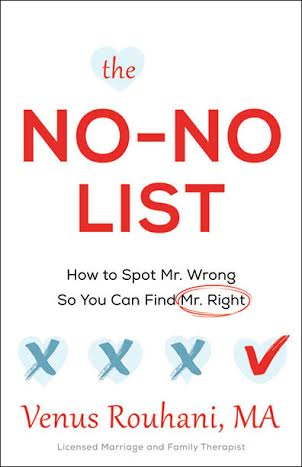Do you ever feel as if you are doing all the right things yet you’re still picking all the wrong people?
We’re told to find someone who shares our interests and values and it will all work out. When it doesn’t, we try for chemistry. When that falls flat, we either give up, try again, or stay in a miserable relationship because, frankly, we don’t think we can do better.
A new book, The No-No List: Find Love by Knowing What You Don’t Want, offers a refreshing alternative to this merry-go-round. While other dating books tell you to find someone who shares your interests and values, The No-No List works backwards, focusing instead on your non-negotiables (or no-nos) in a relationship. These are the characteristics and attributes you absolutely cannot stand.
We chatted with author Venus Rouhani, Licensed Marriage and Family Therapist, about her book.

SDTC: Do you have any tips for seeing ourselves clearly?
VR: It is not difficult to know what characteristics we dislike, cannot tolerate, or cannot live with in another partner even with the lack of awareness about ourselves and our shortcomings. What is difficult is admitting what we don’t want, for fear we might be ashamed of what that reveals about us.
Writing your no-no list helps to define you and your personality. Looking at what you don’t want helps you to learn more about who you are. It is not just the things you don’t want, but rather the words you use to describe them, that reveal the most.
Sure, everybody would like somebody supportive. But when you use the phrase, “I don’t want somebody who suffocates me,” that is very telling. It suggests that you know what it feels like to be trapped and that you need someone who will not push that button. It may tell that you want to be independent, that freedom is a significant value for you, that you don’t want to be tied down or have to take care of someone else’s needs all the time. You may like to be there for someone else, but you don’t want to be the one person your partner relies on to do it all. What you want is a real partner who does his or her share. So defining what “suffocate” means to you will get you to know yourself better.
Can a person’s no-no list change over time?
With growth some changes are expected. Your likes and dislikes may change over time, but not in the most fundamental ways. If anything, your core likes and dislikes will only strengthen as you grow older. One thing worth considering is that you will learn not to react to minor no-nos with the same intensity, but the behaviours that bug you most in other people now are likely to stay the same or get worse as time goes on. People who exhibit those behaviours are unlikely to change the core values and personality traits that cause them to act that way. Meanwhile, you are unlikely to change the core values and personality traits that make it difficult for you to tolerate those issues.

Venus Rouhani, MA
Is there any merit to the idea that the things we can’t stand in another person are the exact things which bother us within ourselves?
Not necessarily. The reason we hate certain things has to do with deep aspects of our character and/or pivotal events in our personal history. Our personality and character are both shaped by the values and principles installed in us growing up and by all sorts of major or traumatic events. The characteristics that we do not want or cannot tolerate in our partners are the ones that go against our core and trigger us.
What if we’ve already settled down with someone who possesses qualities that fly in the face of our no-no list? Is there any hope to make it work?
For the couples that did not know the no-no list and are already in a marriage or a relationship, it is still good to create a list and see the traits of the partner that is giving them a problem. Rating and defining these traits from minor to major (0 to 10), help to realize not every item on someone’s no-no list is a deal breaker. Some can just be small irks. Awareness, being mindful and accepting these minor irks as unchangeable can bring resolute. We should try to understand them and hopefully see the trait from a different perspective, seeing the trait as a gift rather than a weakness. For example, Perfectionism can be looked at as a hindrance, weakness, or a gift of paying attention to the detail, which comes handy in many areas of livelihood.
Unfortunately, I have no solution for traits rated high on the list. These are deal breakers, which either cause the couple to divorce or stay together miserable.
What surprised you the most while writing this book?
I was very surprised to see with all the research and education in the field of dating and marriage we still are practicing what has not resulted well, picking our partners solely on the basis of physical attraction and what we share in common. And yet the divorce rate stays unchanged at 45-49%. Einstein defined insanity as doing the same thing over and over and expecting a different result.
If you could sum up your advice for anyone newly on the dating scene, what would it be?
Selecting a partner for life is a beautiful emotional and romantic thing, but we should not forget that we can also use our rational mind to guide the desires of the heart.
Get to know yourself with all your warts by preparing your no-no list ahead of dating.
Accept who you are and be yourself. Do not pretend to be somebody else to match the society’s pre-formed standard. This change is not sustainable and you only will attract someone who is interested in the pretend you. Remember there is someone out there for everybody, no matter how you look or what you believe in.



 Follow Us On Instagram
Follow Us On Instagram
